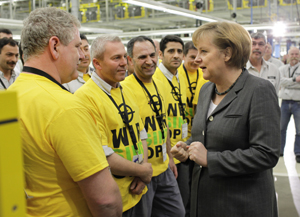
An alliance between Fiat Auto Group and Adam Opel GmbH, the struggling German unit of an equally shaky General Motors Corp., faces tremendous political and corporate barriers, experts in the region say.
Tim Urquhart, an analyst with IHS Global Insight in London, calls a 14-point checklist the German government gave Fiat SpA CEO Sergio Marchionne after their meeting yesterday, “another barrier to a deal being concluded.” And with national elections on the horizon, Urquhart expects the list to become a political football certain to delay a potential resolution between the auto makers.
“While on examination, the list is a sensible checklist of what should be examined from Opel and the German government’s point of view before any deal is approved, it also confirms the sheer multitude of obstacles that need to be overcome for any deal between the two companies to be agreed,” he says in a research note today.
The deal reportedly hinges on E5 billion to E7 billion ($6.8 billion to $9.3 billion) in loan guarantees from a number of European Union governments.
Urquhart says squabbling already has begun between Germany’s Vice Chancellor Frank-Walter Steinmeier, head of the labor-friendly Social Democratic Union, and current Chancellor Angela Merkel, leader of the Christian Democratic Union. Steinmeier and Merkel square off in a September election.
Steinmar accuses Merkel’s party of jeopardizing Opel’s future for not pursuing a partial nationalization of the auto maker. And Merkel’s administration claims Steinmar is siding too closely with his party’s union supporters.
“There are already signs that the future of Opel is being used as a party political tool in advance of the election,” Urquhart writes.
German unions fear a takeover by Fiat will lead to job losses. Marchionne has pledged to keep three Opel assembly plants open but also admits the auto maker’s workforce must shrink.
Opel employs some 25,000 people in Germany, according to a viability plan filed by the auto maker earlier this year, mostly at key manufacturing sites in Bochum, Eisenach and its Russelsheim headquarters.

However, Urquhart says an engine plant in Kaiserslautern likely faces closure, as it produces the same 1.9L diesel engine Fiat makes in Pratola Serra, Campania, Italy.
The 14-point checklist includes questions about the number of jobs threatened by a Fiat takeover company, which would own Opel’s intellectual property; the impact of the transaction and eventual restructuring on Opel’s German suppliers; the financial solidity of the transaction; and the compatibility of corporate cultures between Opel and its buyer.
“While it appears there are some strategic cost savings that can be easily implemented, such as consolidation of the diesel-engine manufacturing and component-purchasing synergies, it is somewhat difficult to see the logic of an alliance between Fiat and Opel, other than to create a company of such critical mass that government support for the project is almost guaranteed,” Urquhart says in his note.
According to Ward’s data, a marriage between Fiat and Opel, along with the Italian auto maker’s pending stake in Chrysler LLC, would vault the combined company to the No.2 seller of light vehicles in Western Europe. Fiat presently occupies the No.4 position.
Marchionne says the combined auto makers also would push Fiat into the annual production range of 5 million to 6 million units, including medium- and heavy-duty vehicles, he considers necessary for a global auto maker to maintain profitability.
The deal also likely would face opposition from Daimler AG, BMW AG and Volkswagen AG, Germany’s other major auto makers.
Recent history suggests alliances rarely work. The former DaimlerChrysler AG unraveled amid culture clashes between Auburn Hills, MI, and Stuttgart, while Fiat’s powertrain partnership with GM fell apart, with the Detroit auto maker having to pay $2 billion to extract itself from the agreement.
Ranjit Unnithan, an analyst with JP Morgan Securities Ltd., sees few near-term benefits from a Fiat-Opel combination.
“While Fiat seems determined to be a key architect of the European automotive landscape, near-term benefits from any such merger may be limited, unless Fiat is successful in reducing excess capacity in Europe,” Unnithan says in a research note issued late yesterday, noting purchasing savings and product collaboration take upwards of four years to be realized.
“It is not clear at this stage if is there is any political will (either in Italy or in Germany) to implement any such capacity restructuring,” adds Unnithan, who values a 50% stake in Opel at E750 million ($1 billion).
Unnithan also expects the proposed deal would require capital from Fiat, which appears to be relying exclusively on government backing for its stake in Opel. Fiat gained its share in Chrysler in exchange for technology and the agreement that Chrysler would get billions more in U.S. government aid to help it through bankruptcy proceedings.
But Fiat Auto Group, which Marchionne wants to spin off after the Opel deal, already carries the lion’s share of the debt at Fiat, estimated by Unnithan at E6.6 billion ($8.8 billion). Adding in Chrysler’s obligations and those at Opel, the new company would be leveraged at an estimated E15 billion to E16 billion ($20.1 billion to $21.4 billion), the analyst says.
Meanwhile, parts-supplier Magna International Inc. confirms its intention of acquiring a minority stake in Opel. The Aurora, ON, Canada-based company did not immediately returns call seeking comment, although more details should emerge tomorrow during its conference call to discuss first-quarter earnings with journalists and Wall Street analysts.
Magna long has expressed a desire to wade deeper into vehicle assembly. The company already operates Magna Steyr Fahrzeugtechnik AG & Co. KG in Graz, Austria, which over the years has built cars, trucks and minivans for Chrysler, BMW and Volkswagen, among others.


